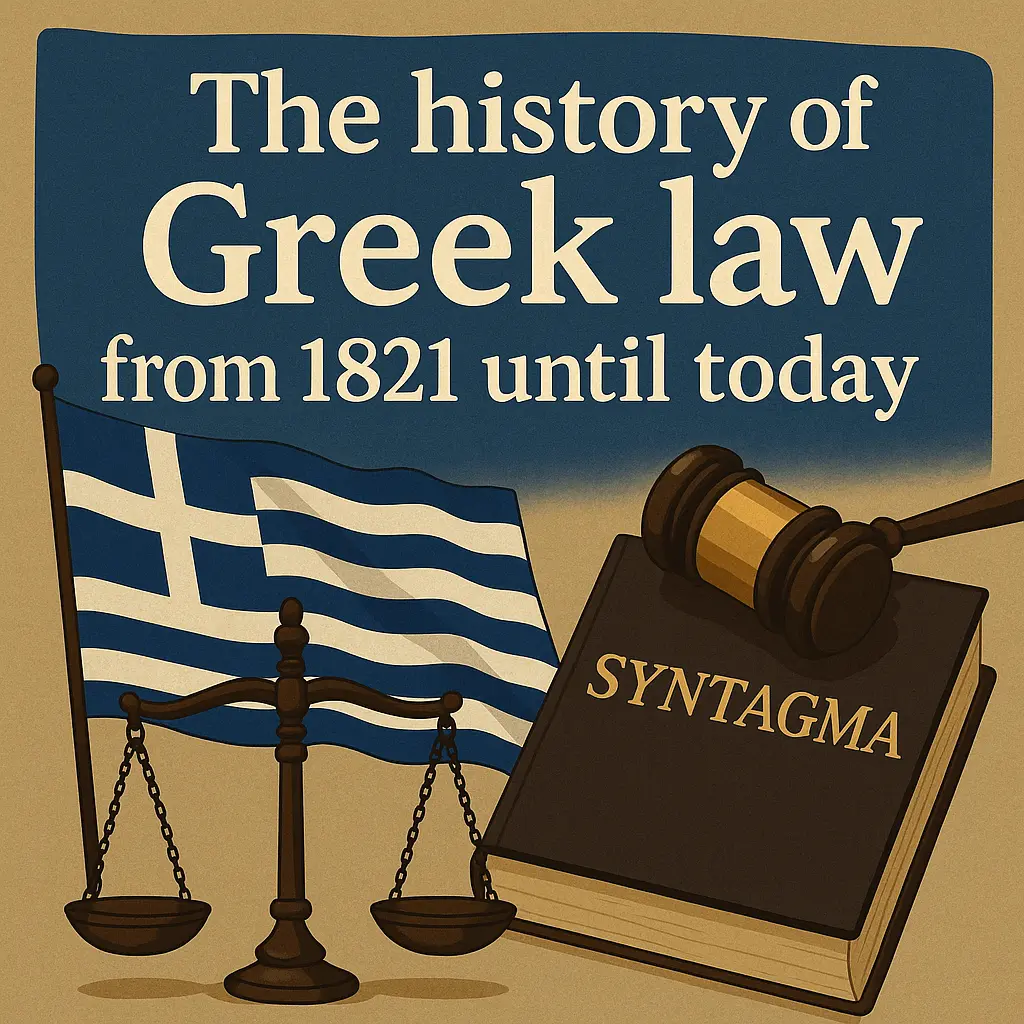
Foundation of the Modern Greek State (1821-1833)
The Greek Revolution began in 1821, creating the need for a new legal framework. During the revolution, temporary constitutional texts were drafted, including the Constitution of Epidaurus (1822), the Constitution of Astros (1823), and the Constitution of Troezen (1827). These early constitutions, influenced by the French Revolution and American independence, established principles of equality before the law and separation of powers.
Bavarian Period and Legal Transplantation (1833-1862)
When Otto of Bavaria became king in 1833, Greece underwent its first major legal transplantation. The Bavarian regency introduced European legal concepts while maintaining elements of Byzantine and customary law. The first draft of the Greek Civil Code was created under Georg Ludwig von Maurer, but it was never fully implemented. Instead, a mixture of Byzantine law (Hexabiblos) and royal decrees shaped the civil law system.
Constitutional Monarchy and Legal Development (1864-1910)
The Constitution of 1864, after the overthrow of Otto, established a constitutional monarchy with stronger democratic elements. This period saw the beginning of systematic codification efforts. The Commercial Code of 1835 (based on the French model) was revised and expanded. The first complete Criminal Code and Code of Criminal Procedure were established in 1834, heavily influenced by Bavarian and German legal traditions.
Legal Modernization (1910-1940)
Prime Minister Eleftherios Venizelos initiated significant legal reforms. The Constitution of 1911 strengthened individual rights and reformed the judicial system. The critical moment came in 1946 with the adoption of the Greek Civil Code, which replaced the mixture of Byzantine-Roman law that governed civil matters. This code, influenced by the German Bürgerliches Gesetzbuch, represented a decisive turn towards European continental legal traditions.
Occupation, Civil War, and Authoritarian Rule (1940-1974)
World War II and the subsequent Civil War disrupted legal continuity. The post-war period saw increased American influence on Greek institutions. The dictatorship of 1967-1974 suspended constitutional provisions and enacted numerous emergency laws. However, the basic legal codes remained largely intact, providing some stability amidst political turmoil.
Democratic Reconstruction and European Integration (1974-2000)
The fall of the military dictatorship in 1974 led to the Constitution of 1975, which established the Third Greek Republic. This constitution strengthened individual rights, restored democratic institutions, and created a strong constitutional court (Council of State). Greece’s accession to the European Economic Community in 1981 represented a critical turning point, requiring harmonization of Greek law with European directives.
The Civil Code underwent significant reforms, particularly regarding family law, with Laws 1329/1983 and 1250/1982 modernizing marriage, divorce, and family relations. The principle of gender equality was firmly established, replacing the patriarchal elements of the original code.
European Integration and Economic Crisis (2000-2015)
Greece adopted the Euro in 2001, further integrating into European structures. The Constitution underwent significant revisions in 2001 and 2008, strengthening social rights and transparency. Greece continued to harmonize its legislation with EU directives, particularly regarding consumer protection, competition law, and digital rights.
The economic crisis that began in 2009 deeply affected the Greek legal system. The memoranda signed with international creditors (EU, ECB, IMF) required extensive legal reforms affecting labor law, public administration, tax legislation, and privatization procedures. These changes were often implemented through accelerated procedures, raising criticism regarding democratic legitimacy.
Contemporary Developments (2015-Present)
After the crisis, Greece has worked to rebuild its legal framework while maintaining European obligations. Law 4548/2018 completely reformed corporate law, while the new Criminal Code and Code of Criminal Procedure of 2019 modernized the criminal justice system. The implementation of e-governance has transformed procedural law, particularly accelerated by the COVID-19 pandemic.
Recent legal innovations include the comprehensive bankruptcy code (Law 4738/2020), designed to address private debt, and environmental legislation adapting to climate change challenges. Greece has also reformed its investment framework to attract foreign capital while strengthening legal protections for refugees and asylum seekers.
Key Legal Milestones
- 1822-1827: Revolutionary Constitutions establish fundamental principles
- 1834: First implementation of the Criminal Code
- 1864: Democratic Constitution establishes constitutional monarchy
- 1911: Venizelos reforms strengthen legal institutions
- 1946: Adoption of the Civil Code, modernizing private law
- 1975: Democratic Constitution establishes the Third Republic
- 1981: EU accession begins harmonization with European law
- 1983: Comprehensive family law reform establishes gender equality
- 2001-2008: Constitutional revisions strengthen rights protection
- 2010-2018: Crisis-induced reforms in multiple legal areas
- 2019: New Criminal Code and Code of Criminal Procedure
- 2020: Implementation of modern bankruptcy framework
The Greek legal system today represents a unique synthesis of the continental civil law tradition, democratic constitutional principles, and European harmonization, shaped by the country’s complex historical journey from Ottoman rule to European integration.

